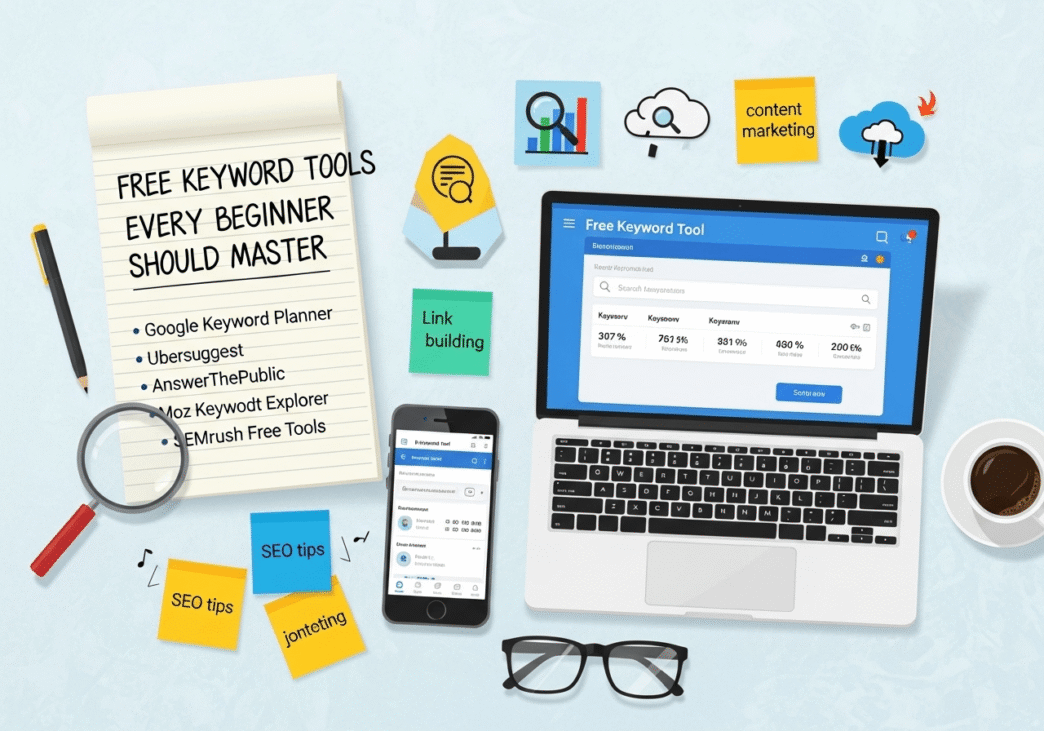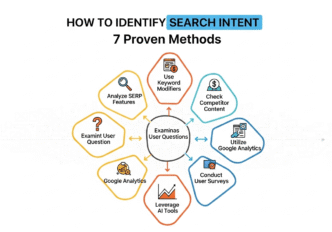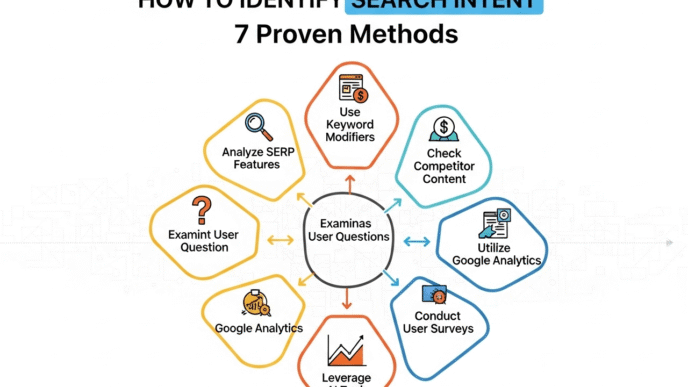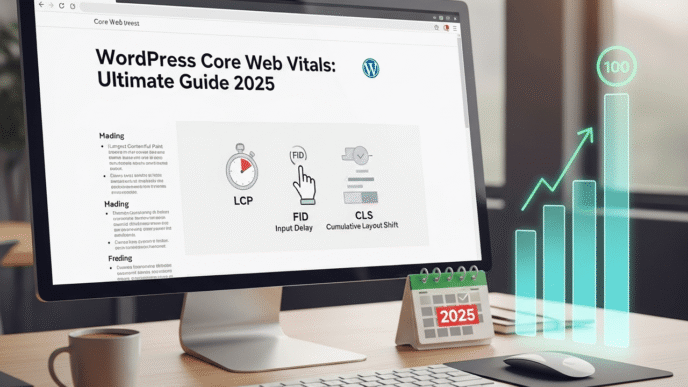Ever felt like you’re throwing darts blindfolded when choosing keywords? You spend hours guessing what people might search for, only to create content that gets about as much traffic as a ghost town on a Tuesday night.
Here’s the reality check: free keyword research tools can be just as powerful as their expensive cousins – if you know how to use them right. While your competitors are dropping hundreds of dollars monthly on premium tools, you can achieve similar results with the right combination of free SEO tools.
The secret isn’t having the most expensive toolkit. It’s knowing which keyword tools for beginners actually deliver results and how to squeeze every drop of value from them without spending a dime.
Ready to discover the best free keyword research tools for beginners that’ll transform your content from traffic wasteland to ranking powerhouse? Let’s dive into the treasure chest.
Table of Contents
ToggleWhy Should Beginners Start with Free Keyword Research Tools?
Starting with free keyword research tools isn’t just about saving money – it’s about learning the fundamentals without drowning in advanced features you don’t understand yet.
Think of it like learning to drive. You don’t start with a Ferrari; you start with something reliable that helps you master the basics. Free SEO tools teach you the core principles of keyword research before you graduate to premium features.
The Hidden Benefits of Free Tools
Zero financial pressure means you can experiment freely without worrying about ROI calculations or subscription renewals.
Simpler interfaces help beginners focus on learning concepts rather than navigating complex dashboards.
Limited features force you to understand fundamentals before moving to advanced strategies.
Pro Tip: Many successful bloggers and small businesses built their entire SEO strategies using only free tools. Master these first, then upgrade when you have the budget and knowledge to justify premium features.
What Makes Google Keyword Planner the Ultimate Free Starting Point?
Google Keyword Planner remains the gold standard of free keyword research tools because it comes straight from the horse’s mouth – Google itself.
This isn’t some third-party interpretation of search data. This is Google telling you exactly what people search for and how often they search for it.
Getting Started with Google Keyword Planner
Setup requirements: You’ll need a Google Ads account (free to create, no spending required).
Core features include:
- Search volume data for any keyword
- Related keyword suggestions
- Competition levels for advertising
- Geographic and language targeting
- Historical trend data
Real-World Example: Local Business Success
A small bakery in Portland used Google Keyword Planner to discover that “gluten-free birthday cakes Portland” got 320 monthly searches with low competition. They created content targeting this keyword and started ranking #2 within three months, generating 40+ new customers monthly.
Key insight: Sometimes the best opportunities hide in plain sight in free tools.
How Can Google Autocomplete Become Your Secret Keyword Weapon?
Here’s a free keyword discovery tool that’s hiding in plain sight – Google Autocomplete. Every time you start typing in Google’s search box, you’re accessing real-time keyword intelligence.
Google Autocomplete suggestions are based on actual search queries from real users. This means you’re seeing exactly what people are typing, not what algorithms think they might type.
The Autocomplete Mining Method
Step 1: Type your main keyword + space Step 2: Add each letter of the alphabet after your keyword Step 3: Note the suggestions for each letter combination Step 4: Dig deeper with question words (how, what, why, when, where)
Example research session:
- keyword research” + a = “keyword research amazon”
- keyword research” + b = “keyword research best practices”
- “keyword research” + c = “keyword research course”
Pro Tip: Use the “alphabet soup” method systematically. Most people stop after a few letters, but going through the entire alphabet reveals hidden long-tail opportunities your competitors miss.
What Free SEO Tools Actually Work for Keyword Discovery?
Let’s cut through the noise and focus on free SEO keyword research tools 2025 that deliver real results without the marketing fluff.
| Tool | Best For | Key Features | Limitations |
|---|---|---|---|
| Ubersuggest (Free) | Beginner-friendly interface | 3 searches per day, basic volume data | Daily search limits |
| Keywords Everywhere | Browser-based research | Real-time data while browsing | Limited free credits |
| AnswerThePublic | Question-based keywords | Visual keyword mapping | 2 searches per day |
| Google Trends | Trending topics | Seasonal patterns, geographic data | No exact search volumes |
| Soovle | Multi-platform suggestions | Searches across multiple engines | No volume data |
Deep Dive: Ubersuggest’s Free Features
Ubersuggest offers more free functionality than most beginners realize:
- 3 keyword searches per day
- Search volume and competition data
- Related keyword suggestions
- Basic SERP analysis
- Content ideas based on keywords
Strategic usage: Don’t waste your daily searches on random keywords. Plan your research sessions and focus on your most important topics.
How to Use AnswerThePublic for Question-Based Keyword Research?
AnswerThePublic is a free keyword finder that specializes in finding questions people actually ask about your topics.
This tool is pure gold for content creators because it reveals the exact questions your audience wants answered.
The Question Mining Process
AnswerThePublic organizes questions into categories:
- What: Definition and explanation queries
- How: Tutorial and process questions
- Why: Reasoning and cause-effect questions
- Where: Location-based queries
- When: Timing and frequency questions
Case Study: A fitness blogger used AnswerThePublic to discover that people were asking “why do squats hurt my knees?” This single question-based keyword led to a comprehensive guide that now ranks #1 and generates 15,000+ monthly visitors.
Which Keyword Analysis Tools Help You Understand Competition?
Understanding keyword competition is crucial for beginners, and several keyword analysis tools help you gauge whether you can realistically rank for specific terms.
Free Competition Analysis Methods
Google Search Results Analysis: Look at the first page results for your target keyword:
- Are there major brands dominating?
- What’s the content quality like?
- How comprehensive are the top results?
- Are there obvious content gaps you could fill?
Moz’s Free Domain Authority Checker: Check the domain authority of ranking pages to understand competition levels.
SERPChecker by Mangools (Free): Provides free SERP analysis with basic metrics for top-ranking pages.
Competition Assessment Framework
| Competition Level | Characteristics | Beginner Strategy |
|---|---|---|
| Low | Small blogs, thin content | Target immediately |
| Medium | Mix of brands and blogs | Target with great content |
| High | Major brands dominating | Avoid or find different angle |
Pro Tip: Don’t just look at domain authority. Sometimes high-authority sites rank with weak content that you can easily outperform with comprehensive, user-focused content.
What Are the Best Free Keyword Research Tools for Beginners in 2025?
Let’s rank the best free keyword research tools for beginners based on ease of use, data quality, and practical value for newcomers.
Tier 1: Essential Free Tools
1. Google Keyword Planner
- Why it’s #1: Official Google data, unlimited searches
- Best for: Search volume validation and idea generation
- Learning curve: Moderate (requires Google Ads account)
2. Google Autocomplete + Related Searches
- Why it’s essential: Real user queries, completely free
- Best for: Natural language keyword discovery
- Learning curve: Beginner-friendly
3. Google Trends
- Why it’s valuable: Trending topics and seasonal patterns
- Best for: Understanding keyword popularity over time
- Learning curve: Easy
Tier 2: Specialized Free Tools
4. AnswerThePublic
- Strength: Question-based keyword research
- Limitation: 2 free searches per day
- Best use: Weekly content planning sessions
5. Ubersuggest (Free Version)
- Strength: User-friendly interface with volume data
- Limitation: 3 searches per day
- Best use: Validating high-priority keywords
6. Keywords Everywhere
- Strength: Browser integration for seamless research
- Limitation: Limited free credits
- Best use: Real-time research while browsing
Tier 3: Supplementary Tools
7. Soovle
- Purpose: Multi-platform keyword suggestions
- Value: Cross-platform insight gathering
8. Keyword Shitter
- Purpose: Bulk keyword generation (despite the name!)
- Value: Large-scale keyword list building
9. WordStream’s Free Keyword Tool
- Purpose: Basic keyword suggestions
- Value: Simple interface for absolute beginners
- Purpose: Your actual search performance data
- Value: Real keyword insights from your existing content
How to Use Free Keyword Research Tools That Actually Work?
Having the tools is one thing; using them strategically is what separates successful content creators from the wannabes.
The Free Tool Workflow
Phase 1: Broad Discovery (Google Keyword Planner)
- Start with 5-10 seed keywords in your niche
- Generate 50-100 related keyword ideas
- Note search volumes and competition levels
Phase 2: Intent Analysis (Google Search)
- Search your target keywords manually
- Analyze what type of content ranks
- Identify the search intent behind each keyword
Phase 3: Question Mining (AnswerThePublic)
- Find question-based variations
- Identify content format preferences
- Discover related topics and subtopics
Phase 4: Trend Validation (Google Trends)
- Check seasonal patterns
- Validate growing vs declining interest
- Compare related keyword popularity
Real Example Workflow: A beginner food blogger researching “meal prep”:
- Google Keyword Planner: Found “meal prep for beginners” (2,400 searches)
- Google Search: Saw mostly list-style and how-to content ranking
- AnswerThePublic: Discovered “how long does meal prep last in fridge?”
- Google Trends: Confirmed “meal prep” peaks in January and September
Result: Created comprehensive meal prep guide targeting multiple related keywords, now ranking in top 3 for 12 different terms.
What Common Mistakes Should You Avoid with Free SEO Tools?
Even with the best free keyword research tools, beginners make predictable mistakes that sabotage their success.
Critical Mistakes to Avoid
Mistake #1: Tool Hopping Without Strategy Jumping between tools without a systematic approach leads to scattered, unfocused keyword research.
Solution: Pick 3-4 core tools and master them before exploring others.
Mistake #2: Ignoring Search Intent Targeting keywords without understanding what users actually want when they search.
Solution: Always manually search your target keywords to see what type of content ranks.
Mistake #3: Volume Obsession Chasing high-volume keywords that are impossible for beginners to rank for.
Solution: Target long-tail keywords with clear intent and manageable competition.
Mistake #4: One-Time Research Doing keyword research once and never updating your strategy.
Solution: Schedule monthly keyword research sessions to discover new opportunities.
Pro Tip: The most successful content creators treat keyword research as an ongoing process, not a one-time task. Set aside 2-3 hours monthly for systematic keyword discovery using your free tool arsenal.
How Can Keyword Research Tools Without Paying Drive Real Results?
Success with keyword research tools without paying comes down to systematic application and smart resource allocation.
Budget-Free Success Stories
Case Study 1: Travel Blogger Using only Google Keyword Planner and AnswerThePublic, a travel blogger identified “solo female travel safety tips” as an underserved keyword. Their comprehensive guide now ranks #1 and generates $2,000+ monthly through affiliate partnerships.
Case Study 2: Local Service Business A handyman used Google Autocomplete to discover “how to fix squeaky floorboards yourself.” His simple video tutorial ranks #3 and generates 50+ service calls monthly.
Case Study 3: E-commerce Store An online plant store owner used Google Trends to identify seasonal interest in “succulent care.” They timed their content launch perfectly and achieved #2 rankings during peak season.
Maximizing Free Tool Value
Combine Multiple Tools:
- Google Keyword Planner for volume data
- AnswerThePublic for question-based ideas
- Google Trends for timing optimization
- Manual SERP analysis for competition assessment
Strategic Timing:
- Use daily search limits strategically
- Plan research sessions around your content calendar
- Focus on high-priority keywords first
Documentation System:
- Create spreadsheets to track keyword research
- Note tool sources for each keyword
- Track keyword performance over time
For a complete beginner’s framework that ties all these tools together, check out our comprehensive keyword research treasure map guide that shows you exactly how to build a profitable keyword strategy from scratch.
Final Thoughts: Free Tools Can Build Million-Dollar Businesses
Free keyword research tools aren’t just placeholder solutions until you can afford premium tools – they’re legitimate research weapons that have powered countless successful online businesses.
The key isn’t having the most expensive toolkit; it’s mastering the fundamentals with reliable, proven tools that don’t cost a penny.
Remember these core principles:
- Start with Google’s own tools for authoritative data
- Focus on long-tail keywords with clear intent
- Validate opportunities with manual research
- Build systematic processes with your chosen tools
- Track results and iterate based on performance
Your budget doesn’t determine your SEO success – your strategy and execution do. Master these 10 free tools, apply them consistently, and you’ll have a keyword research foundation that rivals expensive enterprise solutions.
The only question left is: which tool will you master first?
Frequently Asked Questions
Can free keyword research tools really compete with paid tools?
Absolutely! Free tools provide the same foundational data that powers most premium tools. Google Keyword Planner uses official Google data, and creative use of free tools often reveals opportunities that expensive tools miss. The main differences are convenience features and data presentation, not data quality.
How many free tools should I use at once?
Start with 3-4 core tools to avoid overwhelm. Master Google Keyword Planner, Google Autocomplete, AnswerThePublic, and Google Trends before exploring others. It’s better to deeply understand a few tools than to superficially use many.
What’s the biggest limitation of free keyword tools?
Daily search limits and basic interfaces are the main constraints. However, these limitations force you to be more strategic and focused in your research, which often leads to better results than unlimited but unfocused searching.
How long should I stick with free tools before upgrading?
Upgrade when you can clearly justify the cost through improved results or time savings. Many successful bloggers and small businesses thrive using only free tools. Consider upgrading when you’re generating revenue and need advanced features for scaling.
Do free tools provide accurate keyword data?
Google’s free tools provide the most accurate data available since they come directly from Google. Third-party free tools vary in accuracy, but when used in combination, they provide reliable insights for making informed keyword decisions.
What’s the best free alternative to expensive keyword research software?
A combination of Google Keyword Planner for volume data, AnswerThePublic for questions, and Google Trends for timing creates a powerful free alternative to most premium tools. Add manual SERP analysis and you have enterprise-level insights at zero cost.














